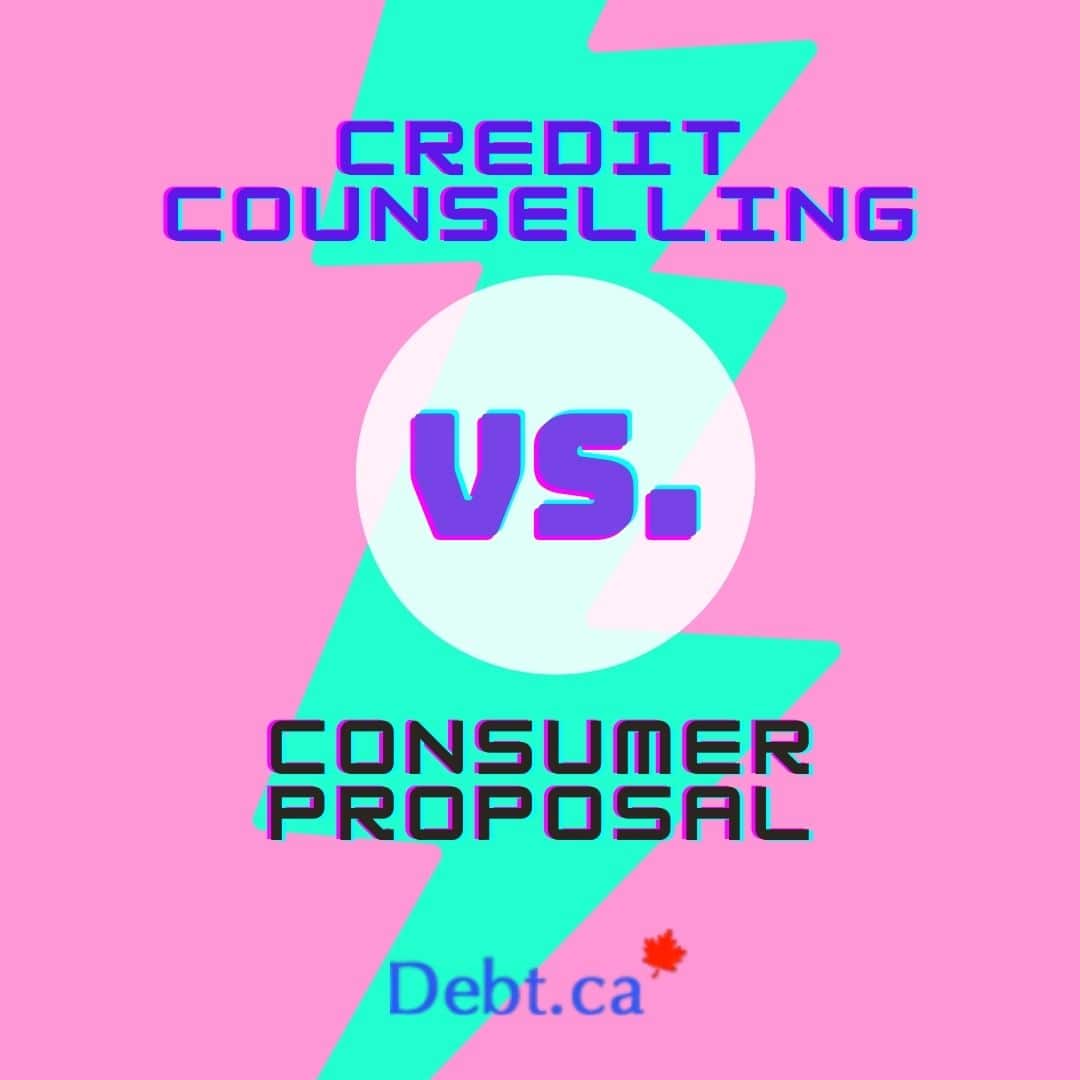According to Statistics Canada, only 30.2% of Canadians are living debt-free. The remaining 69.8% owe about $79,000 per household in total debts. Debt can be overwhelming, particularly if the debt owed is so great that you can’t afford each monthly payment and you’re getting collection calls from creditors.
Fortunately, bankruptcy is not the only option. Debt relief options such as credit counselling or a consumer proposal can help you pay your debt and work on credit repair. Let’s get into Credit Counselling vs Consumer Proposal.
What Is Credit Counselling?
Credit counselling involves working with a credit counselling agency to determine which debt solutions are right for you. Typically, a credit counsellor will assess your finances to determine the amount of debt you have and your ability to repay. The counsellor will then create a debt management plan (DMP).
Your counsellor might advise you on how to create a budget and improve your credit score. They can also help you get a debt consolidation loan from a bank. With credit counselling, you must pay back 100% of your debt within a set period.
Who Can Benefit From Credit Counselling?
You may be a good candidate for credit counselling if you have smaller debts that are under $20,000 (ideally under $10,000). You must have enough income to repay your debts over time and pay the credit counselling fees.
This is a good option if you have the income to repay your debts but might need relief from interest rates. It’s also a good option if you have too much equity in your home to qualify for a second mortgage or debt consolidation loan and don’t want to file a consumer proposal.
What Is a Consumer Proposal?
A consumer proposal is a legally binding debt repayment process that allows you to create new terms with your creditors. You must meet with a Licensed Insolvency Trustee (LIT) to get the process started. The LIT will assess your debts and help you create a proposal to pay a percentage of the debt you owe, ask for an extension on the repayment, or both.
The LIT will file the proposal with Canada’s Office of the Superintendent of Bankruptcy and your creditors will vote to accept or reject the proposal. If those holding 51% of your debt accept the terms, the proposal goes into effect.
Who Can Benefit From a Consumer Proposal?
If you have large debts that do not exceed $250,000 and your budget won’t allow you to pay back 100% of those debts, a consumer proposal may be the best option for you. Many people opt for a consumer proposal when they have overwhelming debt including student loans, tax debts, or outstanding loans. A consumer proposal is an alternative to filing for bankruptcy. You will still have to pay the debt back according to the terms of the proposal, but you can see reductions of about 70% to 80%.
The Pros and Cons of Credit Counselling vs Consumer Proposal
Both credit counselling and consumer proposals are alternatives to filing for bankruptcy. They can help you pay down your debt, reduce interest, and improve your credit score. One way to decide whether to choose credit counselling vs consumer proposal is to look at the pros and cons.
(Infographic chart)
How Much Debt Must be Repaid?
CC: You must pay back 100% of your debt. Interest may or may not be frozen depending on the terms you negotiate with your creditors.
CP: You only pay back a percentage of your debt. In some cases, this could be as low as 20% or 30%. As soon as you file the proposal, all interest is frozen by law.
Monthly Payments
CC: Your monthly payments are based on the amount you owe and the time you have to pay off the debt.
CP: If your proposal is accepted, you can either pay a lump sum or periodic payments. These payments depend on your budget and the terms of your proposal.
Types Of Debt That Can Be Eliminated
CC: Credit counselling helps you formulate a plan to repay all types of debt. Your debt management plan can cover car payments, mortgage payments, student loans, credit card debts, and more. A debt consolidation loan will pay off all your debts at once, leaving you with just one monthly payment to make towards the loan.
CP: A consumer proposal only covers unsecured debt, so you cannot file to have your mortgage payments or car loan payments reduced. However, consumer proposals can include personal loans, lines of credit, credit cards, and even income tax.
Administration Costs
CC: Credit counselling agencies charge for their services. This may be a flat fee or a rate per hour. Typically, not-for-profit agencies will charge less than for-profit agencies. You may have to pay right away, on a monthly basis, or at set time periods.
CP: There are federally regulated administration costs for a consumer proposal, but these are included in the proposal funds. You will never be handed a separate bill for administrative fees because your payments cover these costs and the repayments to your creditors.
Effect Credit Rating
CC: A simple visit to a credit counselling agency will not appear on your credit report. However, if you enter into a debt management plan, an R7 rating will be placed on your credit rating for two years after completion.
CP: When you file a consumer proposal, you will have an R7 rating on your credit rating for three years after completion or six years from the date you filed the proposal.
Duration
CC: The amount of time you spend in credit counselling depends on how much you owe, what your income is, and your interest rate savings. It could take anywhere from a year up to five years to completely pay off your debts.
CP: Consumer proposal terms can vary, but the maximum amount of time you have to pay back your debts is five years.
Agreements with Creditors
CC: Credit counsellors may negotiate with creditors for reduced interest or repayment extensions, but there is no legal authority to enforce them. Therefore, creditors must agree to all the terms. If they don’t, you will have to continue paying them under the pre-existing terms.
CP: As soon as you file a consumer proposal, interest is frozen and creditors must cease contact with you. If 51% of creditors holding your debt agree to the proposal, the terms go into effect. If the proposal is rejected, you will either have to make changes to the proposal and resubmit or consider other options.
Advisor’s Qualifications
CC: All credit counsellors should be accredited through Credit Counselling Canada. However, not all agencies require their counsellors to be accredited. Do your due diligence to confirm that the agency you’re working with is reputable and meets national standards.
CP: Licensed Insolvency Trustees must be licensed by the Canadian federal government. They work for the Office of the Superintendent of Bankruptcy, are federally regulated, and must follow the Code of Ethics for Trustees.
If you’re struggling with debt and want to avoid bankruptcy, you may want to consider credit counselling or a consumer proposal. Do you want to know more about your personal finance options? Speak to a member of our team today.





